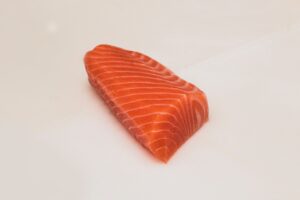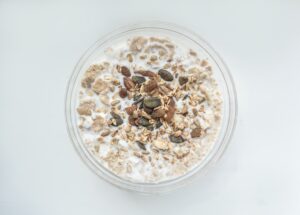How to naturally boost your immune system?
As allergy season approaches, it’s essential to boost your immune system against uncomfortable sneezing, sniffling, and coughing. One effective way to do this is by incorporating superfoods into your diet. Packed with vital nutrients and antioxidants, these immune-boosting powerhouses can help you fend off allergies and enjoy the season to the fullest. In this blog post, we’ll explore five superfoods that are particularly beneficial in strengthening your immune system: tropical fruits, fatty fishes, honey, yogurt, and onions. Let’s delve into these amazing superfoods and explore their extraordinary ability to combat allergies!

Why do you need to strengthen your immune system?
Strengthening your immune system is crucial when it comes to fighting off allergies. Allergens, such as pollen, dust mites, or pet dander, trigger an immune response in sensitive individuals, leading to a range of uncomfortable symptoms. By bolstering your immune system, you equip your body with the necessary tools to identify and neutralize these allergens more effectively. A robust immune system can reduce the severity of allergic reactions, minimize inflammation, and enhance your overall well-being during allergy season. So, investing in immune system support is key to enjoying a more comfortable and symptom-free life when allergies come knocking.
Food can be a powerful ally in managing spring allergies naturally, thanks to the inclusion of specific ingredients renowned for their anti-inflammatory and immune-boosting properties. Incorporating these foods into your diet can help alleviate allergy symptoms and support your overall well-being.
5 Superfoods with remarkable allergy-fighting properties
-
Vitamin C-rich foods: Vitamin C and Bromelain
Tropical fruits like oranges, pineapples, and papayas are not only delicious but also rich in immune-boosting nutrients. Vitamin C acts as a powerful antioxidant that helps combat allergies by reducing inflammation. It also supports the production of antibodies, strengthening your body’s defense mechanism. Additionally, bromelain, an enzyme found in pineapples, aids in reducing mucus build-up and nasal congestion, common symptoms during allergy season.

-
Anti-inflammatory foods: Omega-3 Fatty Acids for a Stronger Immune Response
Salmon, mackerel, and sardines are excellent sources of omega-3 fatty acids. These healthy fats play a crucial role in modulating your immune response and reducing inflammation. By incorporating fatty fishes into your diet, you can bolster your immune system’s ability to fight off allergens, thus minimizing allergic reactions. Aim for at least two servings of fatty fish per week to reap the benefits.
-
Honey: Nature’s Allergy-Fighting Elixir
Raw honey is not only a delicious natural sweetener but also a powerful ally in the battle against allergies. Consuming local raw honey can expose your body to small amounts of local pollen, acting as a form of immunotherapy. Over time, this exposure can desensitize your immune system, reducing the severity of allergic reactions. Add a spoonful of honey to your tea or drizzle it over yogurt or fruits for a tasty and immune-boosting treat.

-
Probiotic-rich foods: Healthy Gut and Immune System
Probiotics found in foods like yogurt, kefir, sauerkraut, and kimchi promote a healthy gut microbiome. A balanced gut microbiome supports a robust immune system, potentially reducing the severity of allergic reactions.
A healthy gut is essential for a robust immune system, and yogurt is an excellent food to promote gut health. Packed with beneficial probiotics, yogurt helps maintain a balanced intestinal flora, enhancing your body’s immune response. Look for yogurt varieties that contain live cultures, such as Lactobacillus and Bifidobacterium, to reap the maximum benefits.
-
Quercetin-rich foods: Quercetin to Fight Allergy
Quercetin is a natural compound found in foods like onions, apples, citrus fruits, berries, and leafy greens. It possesses antihistamine properties and can help stabilize mast cells, reducing the release of histamines that trigger allergy symptoms.
Onions are not only a staple in many dishes but also a potent source of quercetin, a flavonoid known for its anti-allergic properties. Quercetin helps stabilize mast cells, which release histamines during allergic reactions, thereby reducing the severity of symptoms. Incorporate onions into your salads, stir-fries, or soups to boost your quercetin intake and strengthen your immune system against allergies.

This allergy season, arm yourself with the power of superfoods to fortify your immune system and minimize the impact of allergens. Incorporating tropical fruits, fatty fishes, honey, yogurt, and onions into your diet will provide your body with essential nutrients and antioxidants that can strengthen your immune response. Remember, a well-nourished body is better equipped to combat allergies, allowing you to enjoy the season with greater ease and comfort. So, embrace these superfoods and bid farewell to allergy woes!
It’s important to note that while incorporating these foods into your diet may provide some relief, they may not replace proper medical treatment or eliminate the need for allergy medication. Consulting with a healthcare professional or allergist is advisable for a comprehensive allergy management plan.

